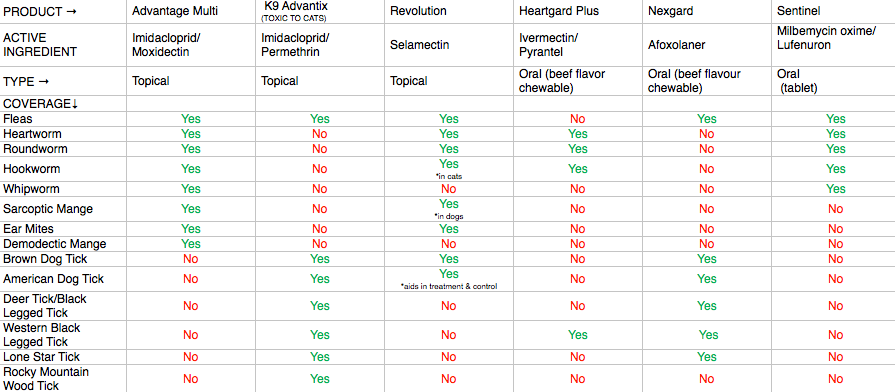Here is a chart that compares popular forms of prevention, both topical and oral, and which parasites they protect against:

How do topical vs oral preventatives work?
Topical preventatives are applied directly onto the skin of the pet and are absorbed into the skin within a few hours. They are designed to keep ticks and parasites from attaching and feeding on your pet. The downside of a topical is that they can be accidentally washed off if your dog frequently swims or is often groomed with shampoos that strip the oils off your pet’s skin. Our recommended topical for heartworm and intestinal parasites is Advantage Multi. Our recommended topical tick product is K9 Advantix as it works by killing ticks on contact. As a tick crawls on your dog in hopes of a meal, K9 Advantix protects your pet by attacking the nervous system of the tick, causing it to die off before biting and feeding on your dog. This product is great for dogs that are in areas that are densely populated by ticks.
Oral preventatives are given to your dog by mouth, either in a chewable or tablet form. They are digested and absorbed into the bloodstream of the dog. As a tick or parasite crawls onto your pet in hopes of a meal, the tick must bite your pet and start to feed in order to receive the medication that is in the tick preventative. The way these are designed to work is that the parasite must feed to receive the medication that is circulating through your pet’s bloodstream—meaning you will see ticks on your dog with oral preventions. Our recommended product for oral prevention is Nexgard for ticks and Heartgard Plus for heartworm and intestinal parasites. Nexgard is a chewable that kills ticks within 8-24 hours before Lyme disease transmission can occur. Oral prevention is excellent for dogs that are sensitive to topicals, large dogs where a topical can be messy to apply, or owners who prefer to easily give a chewable ‘treat’ to their pet once monthly.
Written by West Hill Animal Clinic



